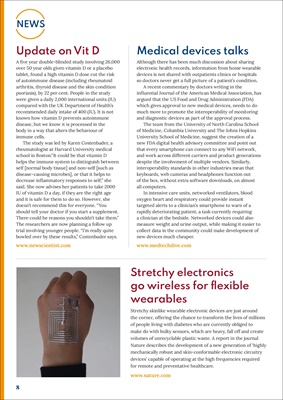
8
NEWS
Update on Vit D
A five year double-blinded study involving 26,000
over 50 year olds given vitamin D or a placebo
tablet, found a high vitamin D dose cut the risk
of autoimmune disease (including rheumatoid
arthritis, thyroid disease and the skin condition
psoriasis), by 22 per cent. People in the study
were given a daily 2,000 international units (IU)
compared with the UK Department of Health's
recommended daily intake of 400 (IU). It is not
known how vitamin D prevents autoimmune
disease, but we know it is processed in the
body in a way that alters the behaviour of
immune cells.
The study was led by Karen Costenbader, a
rheumatologist at Harvard University medical
school in Boston."It could be that vitamin D
helps the immune system to distinguish between
self [normal body tissue] and non-self [such as
disease-causing microbes], or that it helps to
decrease inflammatory responses to self," she
said. She now advises her patients to take 2000
IU of vitamin D a day, if they are the right age
and it is safe for them to do so. However, she
doesn't recommend this for everyone. "You
should tell your doctor if you start a supplement.
There could be reasons you shouldn't take them."
The researchers are now planning a follow up
trial involving younger people. "I'm really quite
bowled over by these results," Costenbader says.
www.newscientist.com
Medical devices talks
Although there has been much discussion about sharing
electronic health records, information from home wearable
devices is not shared with outpatients clinics or hospitals
so doctors never get a full picture of a patient's condition.
A recent commentary by doctors writing in the
influential Journal of the American Medical Association, has
argued that the US Food and Drug Administration (FDA)
which gives approval to new medical devices, needs to do
much more to promote the interoperability of monitoring
and diagnostic devices as part of the approval process.
The team from the University of North Carolina School
of Medicine, Columbia University and The Johns Hopkins
University School of Medicine, suggest the creation of a
new FDA digital health advisory committee and point out
that every smartphone can connect to any WiFi network,
and work across different carriers and product generations
despite the involvement of multiple vendors. Similarly,
interoperability standards in other industries mean that
keyboards, web cameras and headphones function out
of the box, without extra software downloads, on almost
all computers.
In intensive care units, networked ventilators, blood
oxygen heart and respiratory could provide instant
targeted alerts to a clinician's smartphone to warn of a
rapidly deteriorating patient, a task currently requiring
a clinician at the bedside. Networked devices could also
measure weight and urine output, while making it easier to
collect data in the community could make development of
new devices much cheaper.
www.medtechdive.com
Stretchy electronics
go wireless for flexible
wearables
Stretchy skinlike wearable electronic devices are just around
the corner, offering the chance to transform the lives of millions
of people living with diabetes who are currently obliged to
make do with bulky sensors, which are heavy, fall off and create
volumes of unrecyclable plastic waste. A report in the journal
Nature describes the development of a new generation of 'highly
mechanically robust and skin-conformable electronic circuitry
devices' capable of operating at the high frequencies required
for remote and preventative healthcare.
www.nature.com